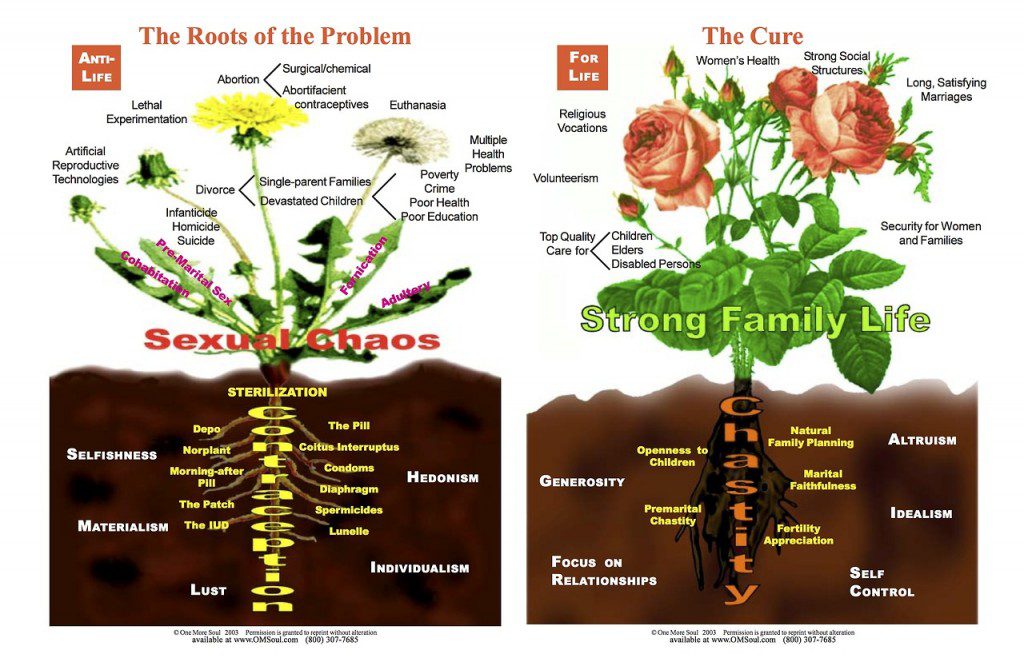The wonderful Libby Anne of Love, Joy, Feminism recently critiqued a poorly-designed graphic made by well-meaning Catholics, saying its “very simplicity…is the downfall of this illustration.” She’s dead right, and I’m thankful that she points it out. Graphics attempting to pixelate the complexities of chastity, marriage, and contraception naturally reduce the intricate, opening themselves to easy criticism.
But if the graphic falls short, Libby Anne’s critiques fall shorter, due — I hope — to a misunderstanding of what the Catholic Church means when she uses terms like “chastity.” Despite this entire affair being a lovely, well-contained, too-simplistic rebuttal of a too-simplistic picture, I’d like to get wild and crazy by suggesting a little complexity and defining a few terms. From Libby Anne:
“For one thing, the idea that contraception is rooted in selfishness as opposed to generosity is wrong. One reason people plan their pregnancies today is so that they can give the children they choose to have more attention and care.”
She’s right. That people “plan their pregnancies” is hardly selfish. But “planning a pregnancy” is not the same thing as using contraception. Catholic women are free to plan their pregnancies, and through the use of effective methods of organic family planning, they do so with 98.2% typical-use effectiveness using the Sympto-Thermal method (1) or 96.8-98.0% typical-use effectiveness using the Creighton Model (2)(3) (to do a little name-dropping up in this blergh). Planning the time of a pregnancy is entirely fitting with the gift of marriage, as the Church makes abundantly, bitch-slap-you-on-the-head-with-a-censure clear in Humane Vitae:
If therefore there are well-grounded reasons for spacing births, arising from the physical or psychological condition of husband or wife, or from external circumstances, the Church teaches that married people may then take advantage of the natural cycles immanent in the reproductive system and engage in marital intercourse only during those times that are infertile, thus controlling birth in a way which does not in the least offend the moral principles which We have just explained.
So yes, “one reason people plan their pregnancies today is so that they can give the children they choose to have more attention and care,” and no, this is not selfish, but no, this has nothing to do with contraception. When the Church says that contraception is rooted in selfishness, she speaks of the act of contraception, not of “planning a pregnancy.”
I certainly don’t expect Libby Anne to agree with the One, Holy, Catholic, Apostolic Church’s particularly resplendent teaching on sexuality, but if you’re going to take down a claim in two sentences, it’s certainly worth understanding the claim, or at the very least investing in some catechetical copying and pasting.
The Church teaches that sex is essentially a unity of persons. It is total self-gift, self-donation, a sacramental offering of the human person’s entire, infinite subjectivity to another. Sexual sin is the frustration of self-gift, the reduction of an infinite unity of persons into anything less. So rape is considered wrong, because it destroys the gift by taking. Sex-just-for-babies is wrong because such sex amounts to the interaction of uterus and sperm, not of total persons.
Now the fertility of a person is an essential part of that person. I think this is seen more clearly in women, for whom the fertile cycle has far more dramatic physical, emotional, and spiritual effects, but the reality of the cyclical woman is the reality of all human beings, for whom the marvelous potentiality of making another human person is an integral part of being human.
When an act of sex up and gets contracepted, the language of sex changes from “all of you” to “all of you except your fertility.” For the Catholic, contraception is wrong not because it allows too much, but because it doesn’t allow enough, namely, the participation of the entire person, which includes their potentiality for the creation of new life, as terrifying as the fact may be. Despite the happy assurances of condom ads, contraception prevents ecstasy, because ecstasy is a total moving-from-the-self, and contraception makes sure a vital part of the self is suppressed and controlled. This is the selfishness which the Church speaks of, this reservation of self via the suppression of fertility via the glories of ethinyl estradiol.
Is this what we desire to do when we use contraception? Of course not. We’re all looking to love in the best way possible, and contraception is haloed by a multitude of loving, altruistic reasonings. We’re to allow pharmaceuticals into our sex lives because, and as Anne mentioned, we “can give the children [we] choose to have more attention and care,” so we can be responsible, so we avoid putting our beloved through a dangerous pregnancy, so we can wait until we have more money, etc. None of these reasons are selfish.
But again, the Church isn’t saying contraception is selfish because all intercourse should bring forth babies. She calls contraception selfish because it disrupts self-gift during the particular act of sex, suppressing through artificial technology the personal fact of fertility, and thus the ability to “bring new life into being.” By saying that “planning a pregnancy” can be unselfishness, Libby Anne frames what the Church agrees with as an argument against Catholic thought, and thereby misses the point. Her next claim:
Similarly, the idea that chastity (meaning no pre- or extra-marital sex) automatically stems from altruism rather than, say, threats of hellfire is also wrong.
I suppose it’s too much to ask that a critique of Catholic teaching is preceded by the accurate description of Catholic teaching. Chastity does not just mean “no pre- or extra-marital sex,” and I’ll straight up bet a sibling on it. The Catholic Church holds the remarkable distinction of writing down every damn bit of doctrine she thinks up, and in her definition of Chastity, beautifully expressed in the Catechism of the Catholic Church, we find that:
Chastity means the successful integration of sexuality within the person and thus the inner unity of man in his bodily and spiritual being.
Yes, Libby Anne is right, chastity-as-the-absence-of-sex does not necessarily spring from altruism. The fact that I destroyed my social skills in an Arrested Development marathon, losing my ability to even speak to beautiful women without the use of inside jokes, and thereby maintained my virginity is hardly an altruistic act of lily-white chastity. But no one besides Libby Anne and the “purity culture” she mistakes for the Catholic Church is claiming such “chastity” as anything but idiocy.
Chastity is the successful integration of sexuality within the person. Sexual integration that comes from a fear of punishment is no t a free, authentic action moving towards a positive goal, but a not-doing moved more by necessity than freedom, a desire to lack Hell that overwhelms the desire to gain Heaven. Chastity is not a flight from God’s justice, but a positive grasp of the self, “an apprenticeship in self-mastery which is a training in human freedom.” (CCC 2338) In fact, the Church specifically disallows her followers to be “chaste” by “mere external constraint” — by merely being too frightened to not be chaste.
t a free, authentic action moving towards a positive goal, but a not-doing moved more by necessity than freedom, a desire to lack Hell that overwhelms the desire to gain Heaven. Chastity is not a flight from God’s justice, but a positive grasp of the self, “an apprenticeship in self-mastery which is a training in human freedom.” (CCC 2338) In fact, the Church specifically disallows her followers to be “chaste” by “mere external constraint” — by merely being too frightened to not be chaste.
Man’s dignity therefore requires him to act out of conscious and free choice, as moved and drawn in a personal way from within, and not by blind impulses or by mere external constraint. Man gains such dignity when, ridding himself of all slavery to the passions, he presses forward to his goal by freely choosing what is good…” (CCC 2339)
Not, need I note, by being really scared of hellfire. So yes, the graphic is too simplistic, but its critique is worse. What gets parried in clipart and simple sentences needs bolstering all around. From Libby Anne:
Additionally, there is literally no reason that contraception would give flower to divorce.
 I can think of a pretty simple reason why an increase in contraception would lead to an increase in divorce. It is a well-discussed fact that childless couples are more likely to divorce than couples with children, and, according to the study “Marital Dissolution: Divorce, Separation, Annulment and Widowhood,” published in the Handbook of Marriage and the Family, “The likelihood of a divorce decreases as the number of children in a family increases.” I am reminded of a study of Qatari women showing precisely the same phenomenon: “For every child in a family, the likelihood that couple will divorce goes down.”
I can think of a pretty simple reason why an increase in contraception would lead to an increase in divorce. It is a well-discussed fact that childless couples are more likely to divorce than couples with children, and, according to the study “Marital Dissolution: Divorce, Separation, Annulment and Widowhood,” published in the Handbook of Marriage and the Family, “The likelihood of a divorce decreases as the number of children in a family increases.” I am reminded of a study of Qatari women showing precisely the same phenomenon: “For every child in a family, the likelihood that couple will divorce goes down.”
Given that contraception is an effort not have children, it’s a smidgebit optimistic to trumpet the impossibility of a link between contraception and divorce. And I can think of quite a few other reasons contraception could be, at the very least, a contributing factor to marital dissolution, though I don’t have the studies to back me up.
For instance, consider that the weight of contraception falls unfairly on women. Men have to wear a free condom. Women have to suppress their menstrual cycles with hundred-dollar pills. There is one contraceptive device for men, and it comes without health risks. There is no end to the contraceptive devices we’ve developed for women, no drop of ingenuity wasted on developing the plethora of caps, sponges, pills, IUDs, patches, rings, and female condoms that have become “a woman’s responsibility.” This gender inequality inherent to contraception would be bad enough even if most female contraceptives didn’t include health risks (like decreased sex drive. (4)(5)(6)(Not exactly a key to an easy marriage.)) So no, it’s not ridiculous to think contraception could be linked to a greater risk for divorce.
On the other hand, it’s also silly to think that chastity naturally results in volunteerism (or that those who use contraception don’t volunteer!) or that chastity is necessary for satisfying marriages (or always leads to them).
Okay, in fairness, the volunteerism bit sounds stupid. But perhaps it will make a little more sense if we begin with Anne’s claim that it’s silly to think that chastity is necessary for satisfying marriages. If we change the definition of chastity to Anne’s definition — a lack of pre-marital sex — then she’s right. You can certainly have a satisfying marriage having had sex before marriage (though it will make it difficult, what with that oxytocin bonding a person to their past sexual partners). But Anne is critiquing — for better or worse — a Catholic graphic, so once again, we need that Catholic definition: “Chastity means the successful integration of sexuality within the person and thus the inner unity of man in his bodily and spiritual being.”
Chastity is certainly necessary for a satisfying marriage, for the simple reason that authenticity is necessary for any sort of self-gift. If we are going to give ourselves, we must be ourselves, and the more we are ourselves, the more we can give. So there is a necessary correlation between chastity — in which a person’s sexuality is held in the hand, integrated into the person, authentically lived, loved, and given — and marriage, which a giving of sexuality to the beloved. If we understand this, we understand why a life of chastity blossoms with charity. Being yourself sexually, which is chastity, helps you be yourself totally, and being yourself totally allows you to give of yourself authentically, leading, yes, to volunteerism (as boring as the word makes the fires of charity).
The moral of the story is this: Catholics, make better graphics. If you can’t, don’t try. Critics, know who you are criticizing. If you can’t, don’t try.













